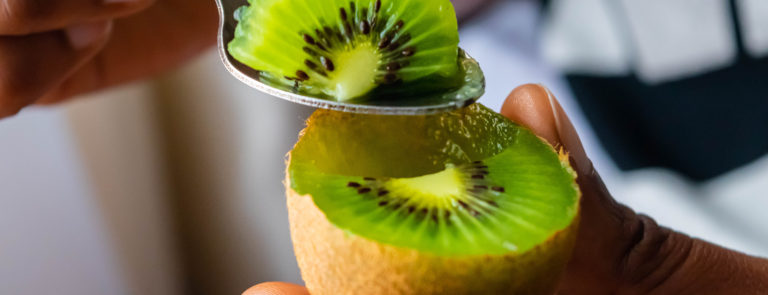10% off £35
Code:SAVE
5 things you didn't know about kiwi fruit

Small, green and mighty – unlock the health benefits of the kiwi fruit today with these 5 facts. Plus 5 more ways to enjoy the fury fruit.
Looks can be deceiving – this fuzzy little fruit is a nutritional heavyweight packed of health benefits. With their jade-green flesh, tiny black seeds and naturally sweet taste – there’s plenty to love about the kiwi fruit. It’s also one of the healthiest fruits around, with kiwi benefits ranging from improved sleep to better skin. But can you eat the skin? Is kiwi good for skin? Why is kiwi a ‘superfood’? We take a look at this underrated fruit to bring you kiwi fruit facts and the lowdown on kiwi nutrition. Here are 5 kiwi health benefits you should know about:
1. Kiwi can help keep your bones strong
Kiwi fruit contains vitamin K, which helps prevent osteoporosis (weak bones) and improves the mineral density of your bones.1
Further, vitamin K deficiency is associated with an increased risk of hip fractures,2 so keeping your levels of vitamin K topped up with foods like kiwi is a great way to protect yourself against bone degeneration, especially as you get older. 1 kiwi fruit contains 31% of your daily recommended intake of vitamin K.
Make sure to eat green leafy vegetables such as spinach, kale and green lettuce (also excellent sources of vitamin K) during another meal that day and you’ll be well on your way to getting the vitamin K you need for bone health throughout life.
2. Kiwi can support immune function
Although oranges are most people’s go-to for a quick hit of vitamin C, the kiwi fruit actually contains more. This is what gives kiwi its ‘superfood’ reputation.
Vitamin C is powerful antioxidant which helps the body fight oxidative damage from free radicals. Free radicals are found in toxins such as cigarette smoke and pollution.3 Even if you live an ultra-healthy lifestyle, free radicals are still made by the body throughout daily life.
You need 40mg of vitamin C every day, which can be met by eating just 1 kiwi!4
Did you know that caffeine can block your body’s absorption of vitamin C? Hold off on that coffee until after you’ve finished your kiwi to reap the full benefits.
3. Kiwi can give you your best skin ever
One of the better-known kiwi fruit health benefits. Kiwis are rich in the antioxidant vitamin E, which is known for promoting skin elasticity and can help protect against the premature ageing of the skin.5
You can also use kiwi fruit topically as an inexpensive skincare hack by rubbing it onto your skin. The natural fruit enzymes in kiwi will help exfoliate the skin by removing dead skin cells and help to leave your complexion brighter. This can increase photosensitivity, so remember your SPF afterwards.
So after you’ve finished your kiwi snack, pop the used skins in the fridge to use before bed.
4. Kiwi can give sluggish digestion a boost
Studies show that kiwi fruit contains a digestive enzyme which helps digest proteins, such as those found in yoghurt, cheese, fish and raw eggs.6
So, having a kiwi after dinner, especially when you’ve eaten something protein-rich, could help beat indigestion and bloating.
5. Kiwi can help you sleep
A small 2011 study found that eating kiwi fruit seemed to improve sleep quality in its 24 participants. After 4 weeks of kiwi consumption, their sleep onset (the time it took them to fall asleep), duration of sleep and efficiency of sleep had all improved.7
When should I eat kiwi fruit for better sleep?
In this study, the participants ate 2 kiwi fruits an hour before bedtime every day for 4 weeks.8 If you’re experiencing any sleep issues, kiwi fruit is a drug-free (and delicious) remedy to try.
How to eat more kiwi
Of course, you can eat them as they come – in their raw form. And yes, you can eat the skin! In fact, kiwi skin has a higher concentration of antioxidants, so you get even more goodness with every bite. Just be sure to give it a wash first and bite directly into it. If you’re not used to eating the skin on a kiwi it might feel a little strange, but once you’ve tried it you might never go back to peeling them.
- With a spoon - slice them in half and eat the contents with a teaspoon – discard the empty skin if you don’t want to eat it. This works best with ripe or slightly over-ripe kiwis, as the tangy flesh comes away from the skin easier if it isn’t underripe as it’s less fibrous.
- Juiced – sip your way to better skin with a kiwi skin Kiwis are easily blended up in a juicer and their intense sweetness makes them a perfect way to make a green juice involving more bitter ingredients (such as kale, spinach or spirulina) more palatable without making the smoothie go an unappetising brown colour. The black seeds will prettify your smoothie too, perfect if you like photographing your healthy concoctions.
- Fruit salad – kiwis make a lovely addition to a rainbow fruit salad. Pair them with orange segments, banana slices, pomegranate seeds, blueberries and mango slices for a beautiful salad which helps you hit your 5 a day. Kids tend to like kiwi fruit as they’re so naturally sweet – and thanks to its impressive vitamin C content it’s great for developing immune systems.
- Creamy, crunchy granola – pair small slices of kiwi fruit with crunchy granola and smooth yoghurt for a delicious parfait which is perfect for a quick breakfast. Make one the night before for each family member – no more excuses for skipping breakfast!
- Fruity ice cubes – this deceptively simple idea really adds the wow factor to cold drinks like sparking water, lemonade or your favourite clear tipple. Puree a few kiwi fruits in a blender or juicer, before pouring the smooth mixture into ice cube trays and popping in the freezer for the next time you fancy a cold beverage.
Last updated: 27 November 2020
- https://www.ncbi.nlm.nih.gov/pmc/articles/PMC5726210/
- https://pubmed.ncbi.nlm.nih.gov/21839190/
- https://www.intechopen.com/books/vitamin-c/vitamin-c-an-antioxidant-agent
- https://www.nhs.uk/conditions/vitamins-and-minerals/vitamin-c/
- https://www.ncbi.nlm.nih.gov/pmc/articles/PMC3583891/
- https://pubmed.ncbi.nlm.nih.gov/23394986/
- http://www.airitilibrary.com/Publication/alDetailedMesh?docid=09647058-201106-201306100024-201306100024-169-174
- http://www.airitilibrary.com/Publication/alDetailedMesh?docid=09647058-201106-201306100024-201306100024-169-174
Related Articles
Shop by wellness goal
Sign up for exclusive offers
Plus, get expert advice to support your health & wellness straight to your inbox when you sign up to Holland & Barrett emails.
Read our
privacy policy














